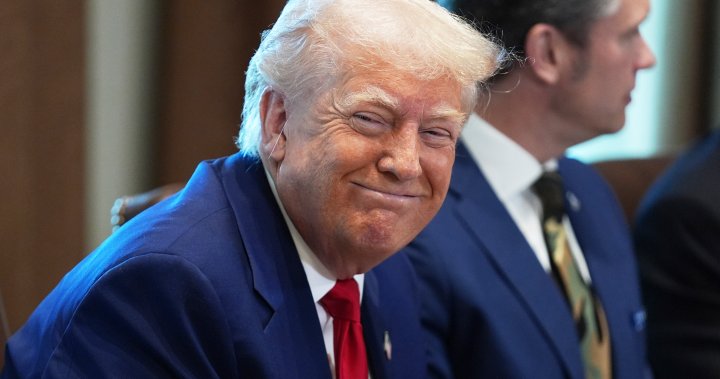U.S. President Donald Trump on Wednesday said he believes a “great relationship” with Canada will be possible under Prime Minister Mark Carney, who is now tasked with seeking a new economic and security agreement with the United States.
Carney’s Liberals won a minority government in Monday’s federal election, which was dominated by Trump’s threats on Canada’s economy and sovereignty.
The Liberals were overwhelmingly viewed in polling as the party best equipped to deal with Trump, and Carney has stressed the need to respond to the “American betrayal” of Canada.
Trump, speaking to reporters during a cabinet meeting at the White House, appeared unbothered by Carney’s public comments and said he congratulated the new prime minister in a phone call Tuesday.
“I think we’re going to have a great relationship,” he said. “He called me up yesterday and said, ‘Let’s make a deal’ … He couldn’t have been nicer.”
The Prime Minister’s Office said Tuesday that Carney and Trump “agreed on the importance of Canada and the United States working together – as independent, sovereign nations – for their mutual betterment” and “agreed to meet in person in the near future.”
Trump said he expects Carney to come to the White House for that meeting “very shortly, within the next week or less.”
Global News has asked the Prime Minister’s Office to confirm if such a trip for Carney has been scheduled.

Trump said the close result of Monday’s election — with the Liberals just shy of a majority, the Conservatives forming the largest Official Opposition in the history of the House of Commons, and the two parties less than 2.5 points apart in the popular vote — was “complicated for the country.”
He also said that, despite Carney’s focus during the campaign and in his victory speech on the threat posed by Trump, that the Liberal leader did not “hate” Trump as much as Conservative Leader Pierre Poilievre.

Get daily National news
Get the day’s top news, political, economic, and current affairs headlines, delivered to your inbox once a day.
“He was running for office,” Trump said, speaking of Carney. “They both hated Trump, and it was the one that hated Trump, I think, the least that won. I actually think the Conservative hated me much more than the so-called Liberal.”
Poilievre focused his own campaign on domestic issues like crime, housing and affordability, but pushed a “Canada First” agenda to combat Trump’s escalating tariffs, echoing the Republican president’s own protectionist policies.
The Conservative leader, like Carney, regularly admonished Trump for suggesting Canada should become the 51st American state, including on the morning of the election.
Carney said in his victory speech early Tuesday morning that he expects to discuss new agreements with Trump face-to-face as prime minister.
“We are over the shock of the American betrayal, but we should never forget the lessons,” Carney told his supporters in Ottawa. “We have to look out for ourselves, and above all we have to take care of each other.
“When I sit down with President Trump, it will be to discuss the future economic and security relationship between two sovereign nations. And it will be with our full knowledge that we have many, many other options than the United States to build prosperity for all Canadians.”

The U.S. State Department on Tuesday touted the “extensive” relationship with Canada and said the Trump administration looked forward to working with the new government on cross-border issues like “trade fairness, combating illegal immigration, halting the flow of fentanyl and other dangerous drugs, and countering the Chinese Communist Party’s influence in our hemisphere.”
Yet multiple White House spokespeople also reiterated Trump’s desire to make Canada part of the U.S. was unchanged, regardless of the election result.
Exit polls conducted by Ipsos for Global News suggested the Liberals won re-election in large part due to older Canadians aged 55 and over who identified Canada-U.S. relations as the top issue driving their vote.
Conversely, younger Canadians aged 18 to 35 flocked to the Conservatives over affordability concerns, which the party was narrowly seen as best to address that issue.
© 2025 Global News, a division of Corus Entertainment Inc.






